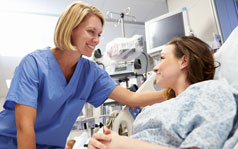PET/CT
Contact Us
Please note that a referral letter is required before an appointment can be confirmed.
Useful Information
About PET/CT
Positron emission tomography (PET) and computed tomography (CT) are types of scan that are used in the diagnosis and treatment of many diseases. Two scans are taken and combined into a single image. In this image the location and activity of abnormal cells can be detected. The CT scan provides a detailed internal image which reveals the location, size and shape of abnormal cells while the highly sensitive PET scan detects the metabolic activity of these cells.
PET/CT scans are useful for the diagnosis and follow up of several conditions including various cancer types, heart conditions and brain disorders.
*Please be advised that the PET/CT centre is in the Mater Misericordiae University Hospital. It is located on the link corridor on the ground floor.
What you should know
The day before your scan
Avoid strenuous exercise for 24 hours prior to your appointment.
Follow a low carbohydrate diet the day before your scan:
- Foods to avoid: breads, crackers, cereals, porridge, pasta, potatoes, rice, noodles, fruit, juice, fizzy drinks and all confectionary foods e.g. chocolate, biscuits etc. No sugar in tea/coffee. No alcohol.
- Foods that can be eaten: any meat (including rashers, sausages, fish and chicken), cheese and eggs, salad but no dressing, vegetables (no potatoes). Tea, coffee and milk are allowed but no added sugar. You can also drink plain, un-flavoured water.
Fast from mid-night the night before the scan.
*Diabetic patients should not change their diet the day before the scan.
The day of your scan
- Continue to fast (from midnight the night before) – you can drink plain, still water only.
- Ensure that you are well hydrated for your scan.
- Take any prescribed medication as usual unless advised otherwise.
- Please ensure you arrive on time for your appointment as the dye use in the scan has a short shelf-life and your scan may need to be rescheduled if you are late (call us in advance if you are running late).
- It is helpful if you wear comfortable clothes without any metal such as zips, underwires, metal buttons etc.
- Female patients should ensure that the appointment occurs on day one to ten of your menstrual cycle, day one being the first day of your period.
- Following check in, a radiology nurse will work through a questionnaire with you and ensure that you have followed the preparation required for your scan.
- The radiographer will then inject the radioactive material into a vein typically in your arm or hand. You will be required to to stay as still as possible for 60-90 minutes to allow the radiotracer to uptake in your body.
- You will be asked to lie on the scan table and will be moved into the scanner.
- The scan can take up to 30 minutes and it is important that you remain very still during the scan.
The radiographer performing your scan will give you instructions regarding radiation precautions to follow after your scan. These typically include:
- Avoiding close contact with infants, children and pregnant women for minimum 6 hours after your injection
- Drinking plenty of fluids and emptying your bladder regularly
- Postponing other tests and appointments for minimum 24 hours after your scan where possible
- Nursing mothers may need to express and discard breast milk for a number of hours following the scan
- Outpatients should leave the hospital as soon as they can following the examination
Your scan will be reported by a consultant radiologist. The results will be sent directly to your referring doctor.
We are all exposed to natural background radiation every day. Medical exposures give a small additional dose on top of natural radiation.
The amount of radiation received during a PET/CT scan is low, resulting in the equivalent of approximately a few months to two year’s background radiation.
The only effect on the patient that is known to be possible at these low doses is a very slight increase in the chance of cancer occurring many years or decades after the exposure.
As long as it is clearly necessary to help make the correct diagnosis and treatment decision, the benefits of detection, diagnosis and treatment resulting from the nuclear medicine examination should outweigh these small radiation risks.







.jpg?sfvrsn=6a6f32bf_1)


